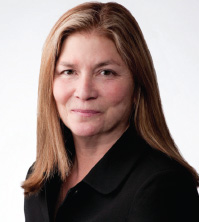
profiles |
1 > |
 Anne Teschner M’06
Anne Teschner M’06
DEGREES: B.A., public administration (University of Massachusetts); M.A. in American studies (Trinity College)
JOB TITLE: Executive director of The Care Center in Holyoke, Massachusetts
FAVORITE TRINITY MEMORY: My first semester in the master’s program I took the required intro to American studies class, and one of our first assignments was to read The American Scholar by Ralph Waldo Emerson. I approached the essay with a somewhat dismissive attitude, thinking it would just be some dusty material from another era, but I remember so clearly reading it and being completely electrified by it. I ended up focusing on Emerson extensively throughout my degree program.
REPORTER: What is The Care Center? Who
does it serve?
TESCHNER: The Care Center is an alternative
education program in Holyoke, Massachusetts,
for pregnant and parenting teen moms. Almost
everyone in the program is a welfare recipient,
and all have dropped out of school and their
goal is to pass the GED exam and focus on
going to college. We have high expectations
of our students, and with those high expectations
is a high level of support. We offer on-site
day care, a nurse practitioner, transportation,
food, and help with case management, so that
these mothers have the support to become
great and inspired learners again.
REPORTER: Can you describe The Care
Center’s curriculum?
TESCHNER: Students are preparing for the
GED exam and focus on that for sure. But in
addition to that work, we encourage our students
to study art and humanities, which comes
as a surprise to some. People often assume
that those in poverty don’t have the luxury or
inclination to study things like art history or
moral philosophy, and that instead they should
focus on finding a job. This stance completely
ignores the reality that people in poverty are
fully rounded human beings. Add to that, people
can often feel incredibly isolated when living
in poverty, but the simple act of reading a
Pablo Neruda poem about love or The Diary of
Anne Frank can lead them to realize that they
are not alone in their struggles. Others have
come before who have grappled with many of
the same problems that our students are facing
and have captured those experiences in literature,
art, and music. Studying the humanities
also helps students develop practical skills–how
to read, write, and speak well. These skills are
critically important for all young people, but for
our students the stakes are even higher as they
are now responsible for another human being.
REPORTER: How is The Care Center structured,
and what are some general outcomes?
TESCHNER: Because we work with people on
welfare, we have had to deal with the changes
that welfare reform has brought. Those
changes often include a “hurry up and get off
welfare” attitude. The problem is that, if someone
is reading at a 5th or 6th grade level, it is
not readily apparent how to get them quickly
through a high school education track.
When thinking about that at The Care Center,
we looked to prep schools. Prep schools are a
place where students succeed. We asked ourselves,
“What does the best education money
can buy look like, and how can we replicate
that?” We analyzed the systems that were in
place at preparatory schools that help ensure
student success. We quickly saw that it was
combination of factors, including a high level of
support offered to students, an authentic level
of partnership between students and staff, and
a rich educational curriculum with a focus that
includes the arts, humanities, and athletics.
We also set into place the expectation that
the teen mothers who come here will go on to
college, even though most are the fi rst in their
family to get a GED. By putting all of those
pieces in place at The Care Center—and the
expectation that students will succeed—we saw
really quickly that we had cracked the code.
People who had been written off as students
were now successful and going on to college at
a rate that rivals those at elite private schools.
REPORTER: How did you become involved in
The Care Center?
TESCHNER: I have been involved for the past
15 years. I had worked for the Massachusetts
Cultural Council and Massachusetts Humanities
Foundation, so I had developed an overview of
what people were doing around the state,
region, and country with regard to teaching art
and humanities, particularly with youth at risk.
When the opportunities at The Care Center
appeared, I thought it would be interesting to
work at the community level. Holyoke has the
highest teen birth rate in Massachusetts—five
times greater than the rest of the state—and
the high school dropout rate hovers around 50
percent. The city deals with numerous cultural
and educational struggles that get in the way of
creating a healthy environment in which young
people can succeed.
(continues on next page)
|
| 1 > |
